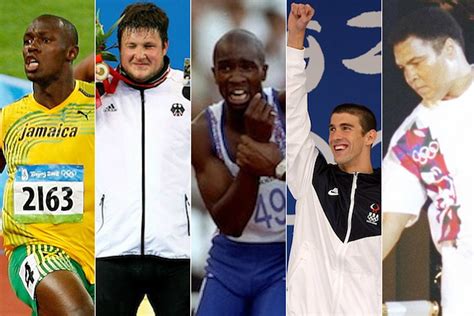Olympic Games: Celebrating Global Athletic Excellence

Explore the history and impact of the Olympic Games, evolution of sports, global unity, and economic & cultural significance in this comprehensive blog post.The Olympic Games, held every four years, have long been heralded as the pinnacle of global athletic competition. As nations gather to showcase their most skilled athletes, the event acts as a unifying force, transcending national boundaries and bringing people together from all corners of the world. In this blog post, we will explore the rich history of the Olympic Games, from its ancient origins in Greece to the modern-day global phenomenon it has become. We will also delve into the evolution of Olympic sports, examining how the games have expanded and adapted to include a wider array of athletic disciplines. Furthermore, we will look at the profound impact of the Olympic Games on the global stage, both economically and culturally. Finally, we will discuss the unique ability of the games to foster global unity and understanding, serving as a platform for nations to come together in peace and celebration. Join us as we celebrate the enduring spirit of the Olympic Games and their significance in promoting global athletic excellence.
History of the Olympic Games
The Olympic Games have a rich and storied history that dates back to ancient Greece, where the games were held in honor of the god Zeus. The first recorded Olympic Games took place in 776 BCE, and they continued for nearly 12 centuries until Emperor Theodosius I banned them in 393 CE. The modern Olympic Games as we know them today were revived in 1896, with Athens, Greece being the host city. Since then, the games have continued to be held every four years, with the exception of the two World Wars.
Throughout history, the Olympic Games have always been a symbol of friendly competition and unity among nations. Athletes from all over the world come together to compete in various sports, showcasing their skills and athleticism. The games have also served as a platform for promoting peace and understanding among different cultures, fostering goodwill and camaraderie.
Over the years, the Olympic Games have evolved to become the largest and most prestigious international multi-sport event in the world. The event has grown in scale and scope, encompassing a wide range of sports and bringing together thousands of athletes from every corner of the globe. The Olympics have come to represent the pinnacle of athletic achievement and serve as a source of inspiration for generations of athletes and sports enthusiasts.
Evolution of Olympic sports
The history of the Olympic Games is a rich tapestry of athletic achievement and human spirit, and the evolution of Olympic sports has played a significant role in shaping this global event. From its humble beginnings in ancient Greece to the modern spectacle we know today, the Olympic Games have seen a remarkable evolution in the variety of sports that are included in the competition.
Ancient Olympic sports were focused on physical prowess and combat skills, with events such as javelin throw, chariot racing, and wrestling taking center stage. These athletic contests were born out of the ancient Greek belief in the importance of a healthy body and mind, and they set the foundation for the future of Olympic sports. As the Olympics evolved over the centuries, the range of sports expanded to include disciplines like running, boxing, and long jump, reflecting the changing values and interests of the societies that hosted the games.
Modern Olympic sports have continued to diversify, with new events being added to the roster to keep the Games relevant and inclusive. Today, the Olympics feature a wide range of sports and disciplines, including swimming, gymnastics, archery, and even newer additions like skateboarding and surfing. This evolution reflects the shifting landscape of international athletics and the ongoing effort to make the Olympic Games a more representative and engaging experience for participants and viewers alike.
Impact of the Olympic Games
The Olympic Games have had a profound impact on the world in numerous ways. One of the most significant impacts is the promotion of international friendship and cooperation. The Games bring athletes from all corners of the globe together to compete in a spirit of sportsmanship and camaraderie. This fosters unity among nations and promotes understanding and peace.
Another important impact of the Olympic Games is the economic boost it provides to the host city and country. The influx of tourists, media attention, and infrastructure development associated with hosting the Games can have a substantial positive effect on the local and national economies. However, there are also concerns about the potential negative economic consequences of hosting the Olympics, such as the cost of building and maintaining facilities.
Furthermore, the Olympic Games have a significant cultural impact. From the opening ceremony, which often showcases the host country’s history and traditions, to the various cultural events and exhibitions that accompany the Games, they provide an opportunity for the world to learn about and appreciate different cultures. In addition, the Olympic Games often inspire artistic and cultural expression, leaving a lasting legacy on the host country’s cultural scene.
Olympic Games and global unity
Olympic Games and global unity
Olympic Games: Celebrating Global Athletic Excellence
The Olympic Games have long been regarded as a symbol of global unity, bringing athletes, spectators, and nations together in the spirit of friendly competition. The Olympics transcend national borders and cultural differences, fostering a sense of camaraderie and cooperation among people from all walks of life. This international event serves as a platform for athletes to showcase their skills and talents on a global stage, while also promoting peace, understanding, and solidarity among nations.
As the world’s premier athletic competition, the Olympic Games provide an opportunity for countries across the globe to come together and celebrate the universal values of sportsmanship, excellence, and fair play. The shared experience of watching athletes from diverse backgrounds and cultures compete in various sporting events creates a sense of common purpose and mutual respect, reinforcing the idea that, despite our differences, we are all part of the global human family.
Moreover, the Olympics serve as a powerful catalyst for promoting peace and understanding among nations, as athletes from different parts of the world come together to compete in the spirit of friendly rivalry. The unifying power of the Olympic Games extends beyond the playing field, as it inspires individuals and communities to set aside their differences and work towards common goals, ultimately contributing to a more peaceful and harmonious world.
Economic and cultural significance of the Olympics
The Olympic Games have a profound impact on the economic and cultural landscapes of the host city and the world at large. The economic significance of the Olympics is evident in the massive influx of tourists, the boost in infrastructure development, and the creation of job opportunities. The host city has the chance to showcase its rich culture, heritage, and traditions to a global audience, thereby enhancing its cultural significance. Additionally, the Olympics promote international cooperation and understanding, fostering unity among nations and celebrating diversity.
From an economic standpoint, hosting the Olympics is a major investment that can yield long-term benefits. Cities and countries that host the games experience a surge in tourism, as people from across the globe flock to witness the event. This influx of visitors results in increased revenue for local businesses, hotels, restaurants, and transportation services. The construction of state-of-the-art stadiums, arenas, and other facilities not only creates employment opportunities during the preparations but also leaves a lasting legacy for the host city, attracting more tourists in the years to come.
In terms of cultural significance, the Olympics serve as a platform for participating nations to showcase their unique traditions, customs, and art forms. It allows for cultural exchange and dialogue, promoting mutual understanding and appreciation among diverse communities. The Olympics also serve as a catalyst for social and cultural initiatives, sparking a renewed interest in sports, health, and fitness. Furthermore, the Games provide an opportunity for the host city to invest in cultural programs, museums, and exhibitions, thereby leaving a lasting impact on the cultural fabric of the region.





